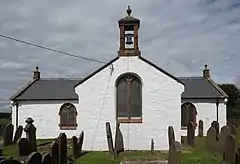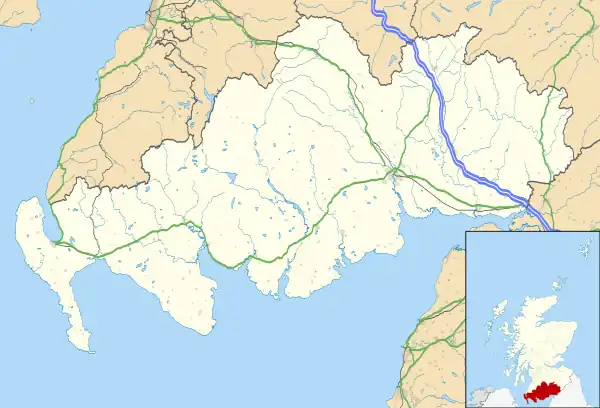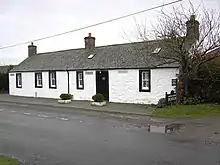Ruthwell
Ruthwell is a village and parish on the Solway Firth between Dumfries and Annan in Dumfries and Galloway, Scotland.
Ruthwell
| |
|---|---|
 Ruthwell Church | |
 Ruthwell Location within Dumfries and Galloway | |
| OS grid reference | NY099674 |
| Council area | |
| Lieutenancy area | |
| Country | Scotland |
| Sovereign state | United Kingdom |
| Post town | DUMFRIES |
| Postcode district | DG1 |
| Dialling code | 01387 |
| Police | Scotland |
| Fire | Scottish |
| Ambulance | Scottish |
| UK Parliament | |
| Scottish Parliament | |
Thomas Randolph, Earl of Moray, gave Ruthwell to his nephew, Sir William Murray, confirmed to Sir John Murray, of Cockpool, in 1509 by King James VI. He was later given the title Earl of Annandale: their landownings in Ruthwell passed by inheritance to Lord Stormont in 1658, and after 1792 to the Earls of Mansfield.[2]
Ruthwell's most famous inhabitant was the Rev. Henry Duncan. He was a minister, author, antiquarian, geologist, publisher, philanthropist, artist and businessman. In 1810 Dr Duncan opened the world's first commercial savings bank, Ruthwell Savings Bank, paying interest on its investors' modest savings. The Savings Bank Museum tells the story of early home savings in Britain. The museum is on the site of the Ruthwell Savings Bank.[3]
In 1818, Duncan restored the Ruthwell Cross, one of the finest Anglo-Saxon crosses in the United Kingdom, now in Ruthwell church, which had been broken up in the Scottish Reformation. This cross is remarkable for its sculpture and inscriptions in Latin and Old English, some in Anglo-Saxon runes, which include excerpts from The Dream of the Rood, an Old English poem. After the Disruption of 1843 in the Church of Scotland, Dr. Duncan became one of the founding ministers of the Free Church of Scotland.
During his youth, Robert Murray M'Cheyne spent summer holidays at Clarence Cottage in the hamlet of Clarencefield near Ruthwell, the home of his maternal aunt. During these visits he would often call to see "Uncle" Henry Duncan at the manse. M'Cheyne's parents were born in this part of Scotland.

The Brow Well is situated 3 km west of the village of Ruthwell. This well, stained reddish by the high levels of iron salts in the water, is the place where Scottish poet Robert Burns hoped to cure his final illness by drinking the iron-rich water.
The village was once served by Ruthwell railway station.

References
- The Online Scots Dictionary
- "Ruthven - Ruthwell Pages 443-445 A Topographical Dictionary of Scotland. Originally published by S Lewis, London, 1846". British History Online.
- Collins, Francesca (30 November 2021). "New owners prevent closure of world's first savings bank museum". Museums Journal. Museums Association. Retrieved 3 December 2021.
External links
- Map of Ruthwell
- The Savings Bank Museum
- Ruthwell Rovers F.C.
- Ruthwell Savings Bank Museum video footage